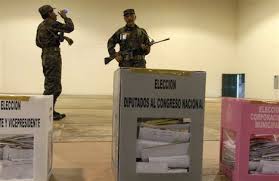After careful consideration of our own observations of the electoral process in Honduras, we find the presidential elections to be inconsistent with democratic principles and rife with fraudulent practices.
We are not surprised that the LIBRE party rejected the preliminary projections of the Tribunal Supremo Electoral (TSE).
The context in which these elections occurred is extremely important. Honduras is a country of about 8.2 million people, the vast majority of whom live in abject poverty. Underemployment currently affects 57 per cent of the economically active population. There are 4 billionaires in this impoverished country who own virtually all major commercial interests, including almost all the mass media. Honduras is also referred to by many as a “narco-state,” meaning most politicians and military leaders are closely aligned with drug traffickers who use Honduras as their primary trans-shipment point for cocaine from South America. These people also have tremendous financial resources. It is also important to note that the TSE of Honduras is comprised of members of the National and Liberal parties (the two parties who have shared power in Honduras for the last one hundred years) but not the LIBRE party and therefore cannot be considered neutral or impartial. In addition, there are no limits to electoral spending by political parties this favours those parties with large financial resources.
It is against these overwhelming powerful interests and tremendous obstacles that the opposition or resistance movement of Honduras has struggled for many years, and especially in the past 4 years since the military coup. The LIBRE party was born out of this struggle.
In visiting various voting centers in and around Tegucigalpa we witnessed evidence to support their claims of electoral irregularities. In numerous locations we bore witness to the open contempt aimed at opposition parties by electoral officials at the voting centers. The Party LIBRE, in particular, was denounced as being politically naive and, in addition, a threat to democracy.
At the municipality of Ojojona we were met by an official who identified himself as being in charge of the voting centre, despite the fact that his ID card indicated he was only a “vocale,” a support person at one of the voting tables. This official described himself as a U.S. citizen and former navy seal with considerable land holdings in the area. He proclaimed his disdain for the LIBRE party stating, “we don’t want those commies here.” He went on to publicly express his “strong support” for the ruling National party. His conduct was visibly approved and condoned by the military police, present at the voting centre.
At a nearby voting station in Santa Ana, security forces demanded details of our identification in an open attempt at intimidation regardless of the fact of our official status which was openly displayed. There were several complaints from voters shared with our delegation of attempts to purchase votes; there were complaints that the National party was doing this at numerous polling stations. In the community of El Aguacatal there was no “custodio” or person in charge of the voting center; a soldier had taken his place. In Surco de Cana there was no cellphone signal, and the custodio in charge did not know how to send the voting results which normally would be electronically transmitted to the central TSE office.
Observers from our delegation were concerned when visiting a polling station in La Joya, a barrio in Tegucigalpa where voters complained that serious infractions of voting rights had occurred. Members of the National party, it was claimed, were permitted entrance to the voting rooms while members of other parties had been loudly and publicly prohibited. At this particular polling station our accredited observers were harassed by TSE officials, supported by military personal, who demanded we refrain from observing ballot counting, which is a critical part of our obligations to ensure electoral fraud does not take place.
In the days leading up to the elections, there were numerous reports of intimidation by Honduran security forces. Masked men with guns presumed to be military police surrounded LIBRE party headquarters on John F Kennedy Boulevard for one hour, two days before the elections, and members of our delegation were present and observed the fear and anger of LIBRE party members. On the night of November 23 Maria Amparo Pineda Eduarte, a peasant Leader of Cooperativa el Carbón a member of the Central Nacional de Trabajadores del Campo (CNTC), and president of a polling station for the LIBRE party in Cantarranas was assassinated along with Julio Ramón Araujo Maradiaga after leaving a polling station training. Many other such incidents have been documented elsewhere.
We urge the Canadian government not to recognize the results of the Honduran elections. There must be an opportunity to do a full, transparent, accurate count, and fully investigate the many reports of irregularities, intimidation and threats by authorities.



